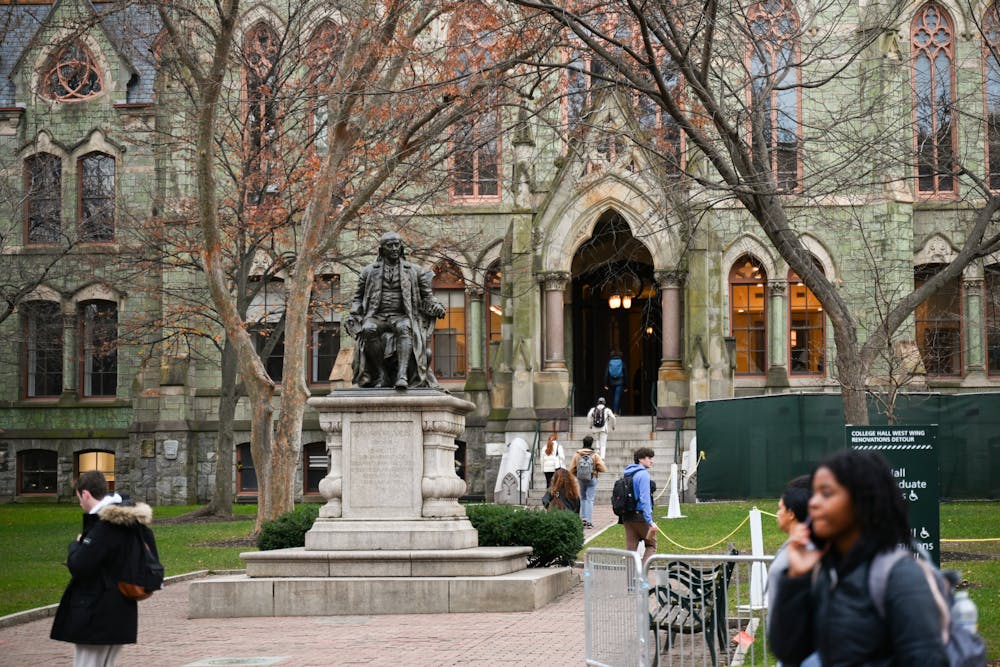Free speech and academic freedom are at the core of a healthy university and, more broadly, a healthy democracy. It is increasingly apparent that one of the greatest perils of today is these rights, coupled with strong demand for political engagement, being curtailed by various forces. We have most recently seen this phenomenon with the demands that Liz Magill resign over her delayed and inadequate response to Hamas’ terrorist attacks on Israel and antisemitism on campus.
I am not going to belabor the details of the Palestine Writes Literature Festival, Liz Magill’s response to the Israel-Hamas conflict, or the demands of billionaire donors for Magill to resign from her post. Even more harshly, one previous alumna claims to charge Magill with complicity in genocide, a claim that I find unfounded and obscene. I do, however, want to explore how this situation relates more broadly to shared faculty governance, why we should protect it, and ultimately why Liz Magill should not resign.
Shared faculty governance is the “joint responsibility of faculty, administrators, and governing boards to govern colleges and universities … to have primary responsibility for such fundamental areas as curriculum, subject matter and methods of instruction, research, [and] faculty status.” In short, it’s the idea that faculty and administrators share the responsibility and power to make decisions about how to run the school, and ultimately, who runs the school.
On Oct. 28, Penn’s American Association of University Professors (AAUP) published a statement expressing grave concern about “violations of academic freedom and shared governance [and] the coercive power that trustees and donors are exercising over academic matters that are the purview of the faculty.”
Marc Rowan, who chairs the board of Wharton and made the single largest donation in Wharton’s history of $50 million, has been at the forefront of this movement to violate academic freedom. He urged other billionaire donors to donate one dollar in lieu of their normal amount to punish Penn and its students for enabling the Palestine Writes festival to occur. This campaign to donate ridiculous amounts to Penn certainly has the ultimate goal to evict Magill from her post, further confirmed by the billboard trucks around campus that aggressively stated how shameful Magill is.
Although the Palestine Writes Literature Festival may have had some speakers that shared controversial views, it was critical for Arab and Palestinian students to congregate and express their identities in a space that was celebratory of them. It is not the place of any donor, no matter how deep their wallet, to influence the political climate or the spaces of academic freedom on campus.
Just last week, the Middle East Center director resigned because the University administration refused to allow Penn Chavurah, a progressive Jewish group, to host a film screening of “Israelism.” The AAUP released another statement addressing how this decision is a blatant violation of academic freedom.
This phenomenon is becoming a trend: Penn is only one of many schools that are being limited in their free speech and academics. While Penn has one of the lowest free speech rankings in the country, other schools like the University of North Carolina and the University of Florida with higher free speech rankings still have faced external pressures to change their curriculum or research activities to align with certain political interests.
SEE MORE FROM ALLISON SANTA-CRUZ:
The vicious underbelly of the Women’s World Cup
Sarah Jackson, a Presidential Associate Professor at the Annenberg School for Communication, mentioned these universities in a class of hers that I am in. In an interview, she explained that “in the last decade, we have seen an increasing number of concerning incidents in which the principles of shared governance and academic freedom at universities have been bulldozed. In these cases, faculty are often the first affected, and thus, faculty have great concern about these issues.”
It’s not only faculty who feel the insidious effects of political schemes controlling the academic freedom and shared governance of our university. As Mackenzie Fierceton noted in an interview with the Prospect, “students who rely on scholarships are forced to realize that their education is dependent on elite, conservative donors who can impose their political preferences on the University to silence speech on campus.”
I must note that the effects of political control on the ability to express free speech are not only being controlled by one side of the aisle. There are many valid concerns about the effects of cancel culture, perpetuated by people who tend to be liberal. What’s most apparent, now more than ever, is that free speech is under attack from all corners, and it’s a product of the greater American political mood and climate. The ultra wealthy have only become wealthier in recent years and, as a result, are trying to exert even more control over America’s academic and cultural institutions.
So no, I don’t believe Liz Magill should resign just because ultra wealthy people want her to. We have to recognize that this move is a political ploy with the potential to have extremely detrimental consequences for not only us students but also faculty. Magill is in a very vulnerable position with much less power than we would typically assume.
It is not for the ultra wealthy, the administrators, or even the faculty to decide what we should read, hear, learn, speak, or think. That is one of the most beautiful things about education: we can be freely exposed to a myriad of ideas and frames of thought that we will agree and disagree with. It is the mark of the American ideal of education. We must fight to protect the freedoms that are necessary to create the learning environment we deserve.
ALLISON SANTA-CRUZ is a College junior studying communications from Jackson, Miss. Her email address is allisant@sas.upenn.edu.
SEE MORE FROM ALLISON SANTA-CRUZ:
The vicious underbelly of the Women’s World Cup









